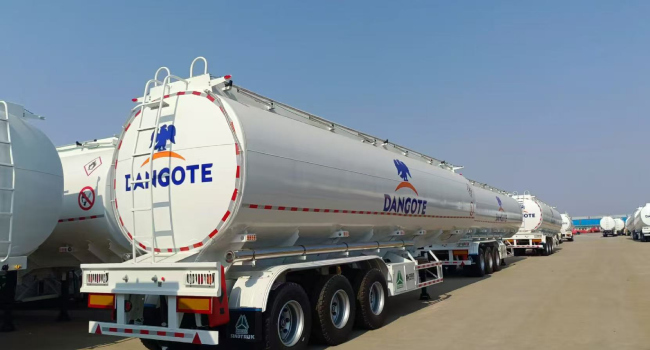Mbonu claimed that the deployment of thousands of CNG-powered tankers is a response to a blockade by market competitors who allegedly refused to lift products from the refinery.
“Now I’m linking something you may not know that has to do with the 4,000 trucks Dangote initiative. It came from the fact that ‘it’s either I do that or I die, “Mbonu stated on the show.
“He was producing, he had products, but they were not buying from him. Rather, they were illegally importing petrol.”
“So the guy just said, ‘I am gonna survive,’ and said, ‘Let me fight this out.’ That’s why he said, ‘Who are the people that buy this petrol? Let me take the fight to them.”
While this revelation has not been officially confirmed by the Dangote Group, Mbonu emphasised that his claims are based on direct communication with Aliko Dangote himself.
Distribution Strategy Backed by CNG Technology
On June 15, 2025, Dangote Petroleum Refinery announced it would commence large-scale distribution of Premium Motor Spirit (PMS) and diesel starting August 15, 2025. As part of this sweeping rollout, the company unveiled a fleet of 4,000 brand-new CNG-powered tankers to deliver fuel nationwide.
According to the company, free logistics support will be made available to a wide range of stakeholders, including registered petrol dealers, major marketers, manufacturers, telecom companies, aviation firms, and other energy-intensive consumers.
The refinery is also establishing CNG daughter booster stations and mini distribution hubs, supported by an additional fleet of over 100 specialised CNG tankers.
Economic and Environmental Impact
This transition to CNG-powered distribution aligns with broader goals to reduce logistics costs, increase fuel accessibility, and promote the adoption of cleaner energy alternatives in Nigeria’s downstream oil and gas sector.
Experts believe the initiative could have transformational ripple effects, such as reviving dormant petrol stations and depots, lowering operating and distribution expenses for businesses, and supporting the growth of SMEs by improving access to reliable energy.
It could also help in generating jobs across the petroleum and logistics value chain, extending fuel access to underserved and rural communities, and easing inflation and boosting economic recovery, especially in economically fragile areas.
By removing reliance on traditional diesel-powered transportation and offering direct-to-consumer logistics, Dangote’s bold move is being hailed as a pivotal moment for Nigeria’s energy independence and downstream resilience.
What You Should Know
Under the new distribution programme, direct sales will be available to fuel marketers, manufacturers, telecom companies, and other major users. Petrol stations sourcing PMS or diesel directly from the Dangote Refinery will benefit from the complimentary delivery service.
The refinery has introduced a credit facility for bulk buyers. Companies purchasing a minimum of 500,000 litres will be eligible for an additional 500,000 litres on credit, repayable within two weeks, subject to a valid bank guarantee.
The company also acknowledged the Federal Government’s support through the Naira-for-Crude exchange scheme, which it said has helped stabilise fuel supply amid global market volatility.
The company says it remains committed to making energy affordable, accessible, and sustainable for all Nigerians, rural or urban, small-scale or industrial.


